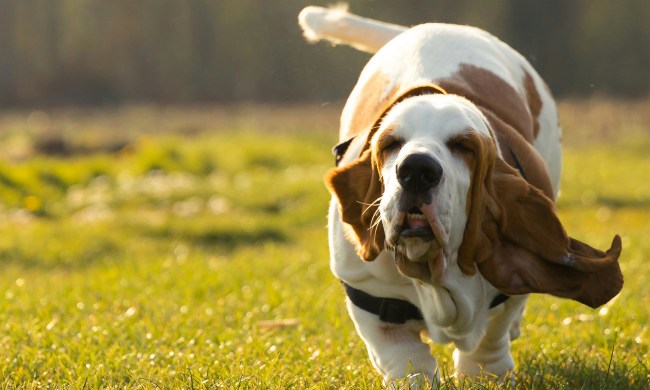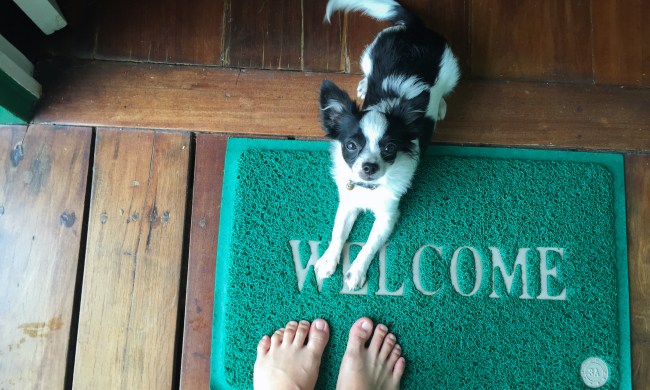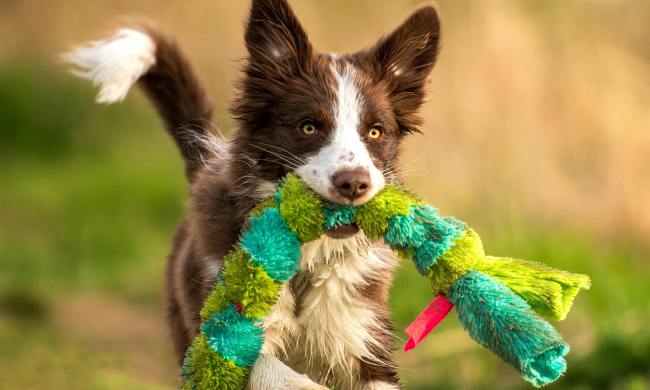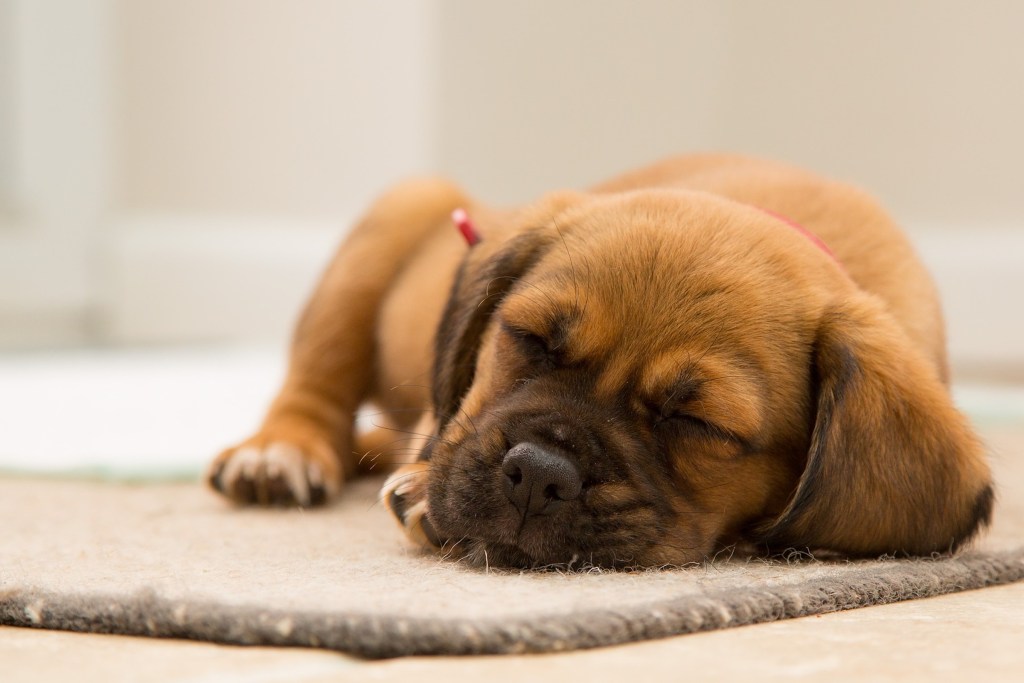
Bringing home a new puppy means you’re in for a whole lot of cute … and a lot less sleep. Before 4 months of age, a pup’s sleeping schedule consists of naps throughout the day and night — not the nighttime slumber you’re used to! This is a habit he’ll grow out of, but with a few cozy arrangements, you can help your puppy sleep through the night with ease.
Puppy sleep training takes some preparation and time, but it can be done. The first few nights might be difficult if you have a stubborn pup who isn’t ready to hit the hay, but he’ll get used to it in time. Here’s what you need to know.
According to the folks at Purina, a puppy is likely to sleep all the way through the night around 16 weeks of age. Although they will need a lot of sleep — around 17 to 20 hours a day — for the first several months of life, these naps will come in small chunks throughout the day. Just like human babies, young puppies alternate between periods of energy and rest, so it’s important to let them sleep when and where they need to.
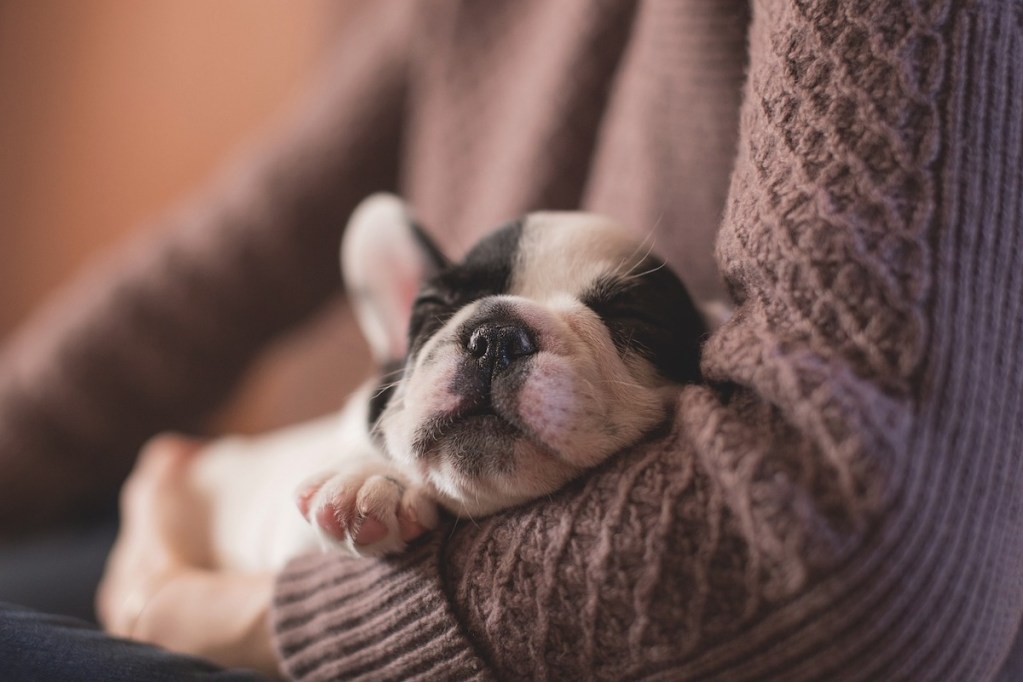
Should you crate train your puppy?
Sleeping in a crate can benefit both you and your dog, especially when he’s younger. A small puppy will have trouble controlling his bladder and might want to chew, which means containing him is essential to keeping him safe. You definitely don’t want your animal to swallow something dangerous in the night or while he’s home alone.
Some owners decide to retire the crate after their pooch has outgrown this phase, but many dogs prefer to have their own space. Remember, pups love to burrow in their dens as it makes them feel safe and cozy. No matter what sleeping arrangements you come up with, you’ll want to ensure he has everything he needs.
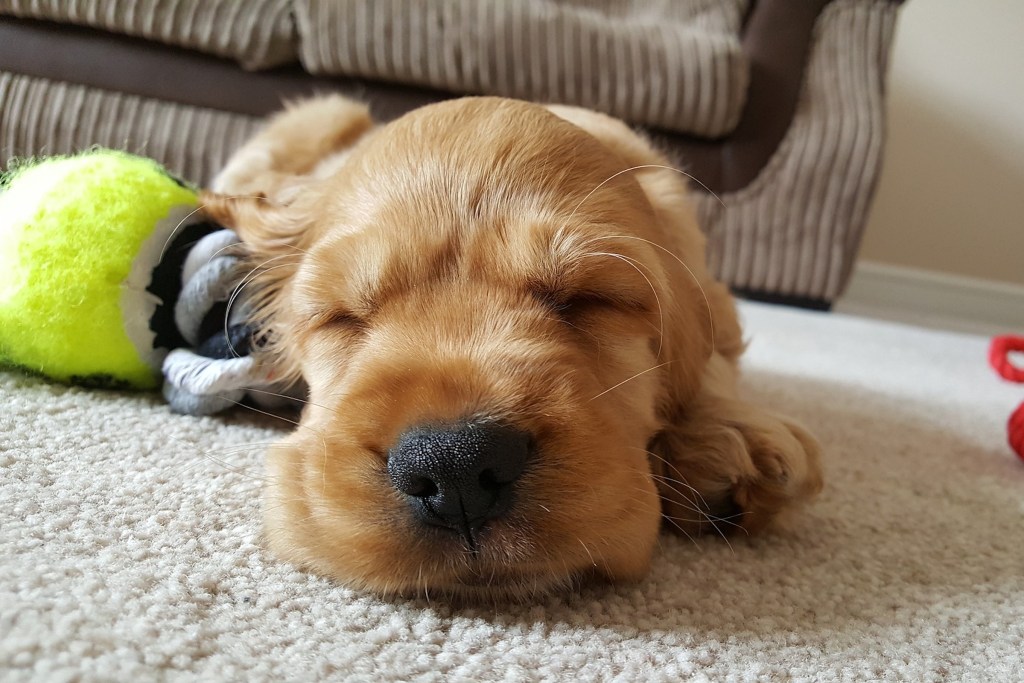
Puppy sleep training – how to help them make it through the night
Although you shouldn’t wake a sleeping puppy, even during the day, you can do a few things to encourage them to follow a nighttime sleep schedule. It’s smart to think about how you’d like nighttime with your dog to be when he’s older so you can begin teaching him to behave appropriately now. For example, you might not mind sharing your bed with a tiny puppy, but will you change your mind when your dog grows into an 80-pound behemoth? It’s far easier to teach desired behaviors to a pup than to reverse actions in an older dog, so think ahead!
Establish a bedtime routine with your puppy – and stick to it
The keys to teaching a puppy any new routine or behavior are repetition and consistency. Repetition helps your dog’s brain make the connection between the action and the reward (or consequence), while consistency removes room for any confusion.
To apply these principles at bedtime, make sure your puppy is always put to bed in the spot you want him to sleep in permanently. If you intend to use a crate, this is a perfect time to introduce it. The crate can be in your bedroom so your puppy still feels included and safe, but he needs to stay in it overnight no matter what kind of heart-melting crying may result. It’s not always the smoothest transition, but soon your pup will learn that his crate is a safe place for rest and relaxation.
Dogs are creatures of habit, so it can help to keep your bedtime routine to the same time every day. Before you know it, your beastie will be reminding you it’s time for bed.
Tire out your puppy before bedtime
Young puppies may not last the entire night without needing to potty, so a trip outside might be necessary at first. Other than this, though, all your dog’s needs should be taken care of before bedtime. You can reduce unnecessary bathroom breaks in the middle of the night by making sure all eating and drinking is done an hour or more before bed. Even if you expect a trip outside overnight, don’t forget to take Fido out to relieve himself before sleeping.
It may seem counterintuitive at first, but playtime before bed can do wonders for a growing pup. You’ll probably find your dog dozing off quickly after exercise, whether walking or playing, as his body needs to rest and restore the energy he lost so fast. It can be both helpful and fun to use this to your advantage when it’s time for a good night’s rest.
Create the right environment for sleep
It’s crucial to help your puppy learn that when it’s dark, it’s time to sleep, so placing a blanket over his crate may help create a comfy, den-like feel. If he’s not using a crate, his sleeping space should be cozy, quiet, and dark — just like a bedroom for you. To encourage your pup to sleep, try to minimize distractions, such as TV noise.
Think over which materials you’ll use to create his bed space, as some are easier to chew and tear than others. Whether your dog is a chewer, accidents and other messes do happen, which makes inexpensive, felted blankets ideal. Some pups like to lean or rest their head on a pillow, so additional blankets are never a bad idea. As your puppy grows, you’ll get to know his sleeping habits and personality; once he’s a bit older (and less destructive), he can upgrade to his very own dog bed.
A puppy’s irregular sleeping habits can be tricky to handle at first, but with some patience and practice, you can help him transition to a schedule that works for the two of you. As he grows, he’ll sleep through the night, and as long as he’s comfy, both you and your fur baby are in for a good night’s sleep.

